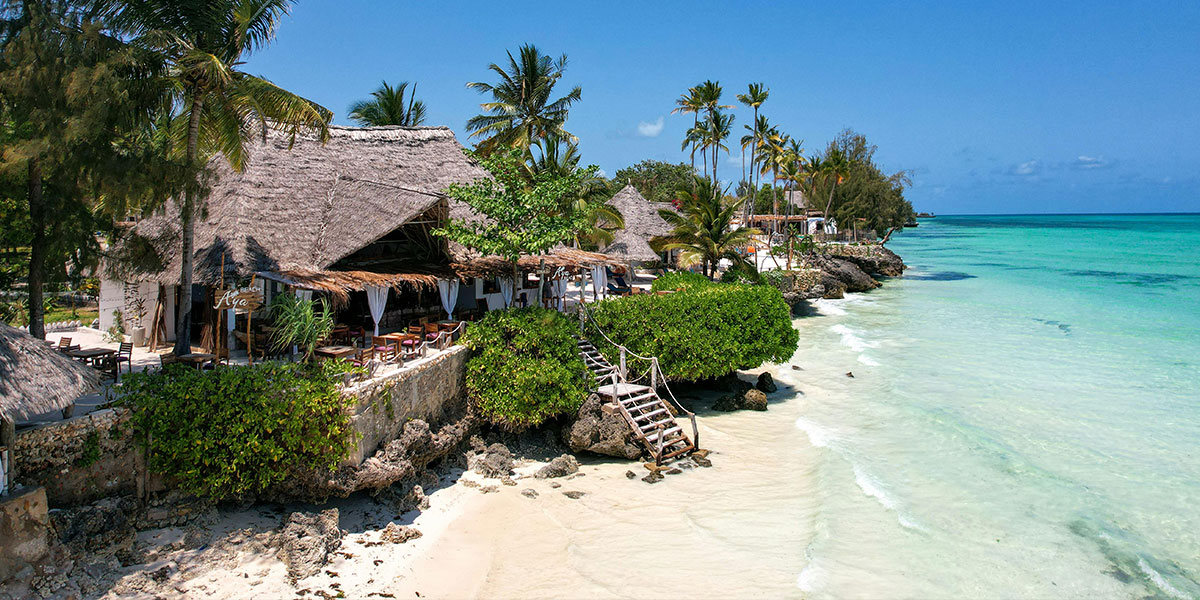Zanzibar: The Dazzling Island of Cultural Fusion and Pristine Beaches
Off the coast of mainland Tanzania lies a slice of paradise that has enchanted travelers for centuries – Zanzibar. Known for its fragrant spice farms and rich cultural tapestry woven by centuries of Arab, Persian, Indian, Portuguese, and African influences, Zanzibar captivates not just with its history, but also with the idyllic beauty of its white sandy beaches and azure waters.
The moment you step onto the island, you’re greeted by the warm Swahili welcome, “Karibu Zanzibar,” transporting you to a world where time seems to stand still. Meander through the winding alleys of Stone Town, a UNESCO World Heritage site, and you’ll be mesmerized by the ornate doorways, bustling bazaars, and the aroma of freshly ground spices wafting through the air.
But Zanzibar’s allure doesn’t stop at its cultural heritage. The island is a sanctuary for beach lovers and water sports enthusiasts. Dive into the Indian Ocean and explore the vibrant coral reefs teeming with marine life. Embark on a traditional dhow for a sunset sail, or simply relax under a thatched parasol on powdery sands.
As we peel back the layers of Zanzibar’s allure, join us on a journey to discover the mystique of the Spice Island. Through our blog, we invite you to explore the enchanting blend of history, culture, and nature that Zanzibar offers. Whether you’re seeking a tranquil escape or an adventure in the sun-kissed African tropics, Zanzibar is a destination that truly has something for everyone.
When is the best time to visit Zanzibar?
When planning a trip to Zanzibar, timing is everything. Known as the Spice Island, Zanzibar is a year-round destination, but depending on what you’re looking for, some months may be better than others.
- Dry season: June to October The dry season, from June to October, is widely considered the best time to visit Zanzibar. The weather is mostly sunny, the humidity is lower, and there is very little rainfall, making it perfect for beach activities and water sports. The clear skies and calm seas during this time are ideal for diving and snorkeling, with visibility at its peak.
- Short rains: November to December November and December are marked by the short rains, which generally consist of short, heavy downpours followed by sunshine. These months can also be a good time to visit, as the island is less crowded and the landscape is lush and green. Just pack a light raincoat and be prepared for the occasional shower.
- Hot season: December to February The hot season spans from December to February. This is a great time for those who love the heat, and it’s also peak tourism season, coinciding with the holidays. While Zanzibar is a popular destination for a sunny Christmas holiday, expect larger crowds and higher prices.
- Long rains: March to May The long rains occur from March to May, with heavier and more prolonged periods of rainfall. While this is the low season due to the wet conditions, it does have its advantages. The crowds are few, the prices are lower, and the island’s flora and fauna are in full bloom. For travelers who don’t mind wetter conditions, it’s an excellent time to enjoy the beauty of the island without the crowds.
- Cultural events: For culturally minded travelers, Zanzibar offers a variety of festivals, including the famous Sauti za Busara music festival in February and the Zanzibar International Film Festival in July. Planning your visit around these events can add an extra layer of excitement to your trip.
No matter when you choose to visit, Zanzibar remains a gem in the Indian Ocean, offering pristine beaches, rich history, and a warm welcome. Whether lounging on the shores of Nungwi or exploring the cobblestone streets of Stone Town, Zanzibar is sure to give you memories that will last a lifetime.
Discover the Hidden Gems of Zanzibar: A Treasure Trove of Sights
- Stone Town: The heart of Zanzibar’s historical charm, Stone Town is a labyrinthine collection of narrow streets, carved doors, palaces, and bazaars. Declared a UNESCO World Heritage site, this old part of Zanzibar City is a living museum where history resonates around every corner. Don’t miss the Old Fort, the House of Wonders, and the poignant Slave Market site.
- Spice tours: Zanzibar was once the world’s leading producer of spices such as cloves, nutmeg, and cinnamon. A guided spice tour not only allows you to see, taste, and smell these exotic condiments but also provides an insight into the island’s rural life.
- Jozani forest: Home to the rare Red Colobus monkeys and a variety of other animal and plant species, the Jozani Chwaka Bay National Park is a lush, tropical rainforest offering guided walks through the swamp forest and mangroves.
- Diving and snorkeling: Zanzibar’s marine life is as vibrant as its culture. The coral reefs surrounding the island are teeming with life. Mnemba Atoll and Tumbatu Island are two of the most popular spots for underwater exploration.
- Sailing on a traditional Dhow: No visit to Zanzibar would be complete without experiencing the serene pleasure of sailing on a traditional dhow, enjoying the island’s scenic beauty from the water and perhaps even catching a glorious sunset.
- Forodhani gardens: A lively seafront park where you can sample an array of Zanzibar’s street food, including seafood, Zanzibari pizzas, and sugar cane juice.
- Prison island: A short boat trip from Stone Town, Prison Island provides a glimpse into the island’s past used as a detention center for rebellious slaves, and it is now a sanctuary for giant tortoises.

In Zanzibar, the sights are as diverse as its history. Beyond the listed attractions, the island’s greatest joy is in its capacity to surprise – don’t be afraid to venture off the beaten track and discover your own piece of paradise. Whether lounging on sun-drenched shores or wandering through historical alleys, Zanzibar offers an immersive experience that will capture your heart.
Exploring the Island’s Best Beaches
As a shimmering jewel in the Indian Ocean, Zanzibar’s beaches are everything an island seeker could dream of – powdery white sands framed by swaying palms and turquoise waters. But with so many stretches of sand to choose from, where should you lay your beach towel? Here’s a run-down of the best beaches on Zanzibar that offer something for everyone.
- Nungwi Beach
Situated on the northern tip of the island, Nungwi is often hailed as one of Zanzibar’s most picturesque beaches. It’s famed for its mesmerizing sunsets, vibrant nightlife, and diverse marine life. The beach itself is a broad expanse of fine, white sand that doesn’t disappear even during high tide, making it perfect for sunbathing and swimming all day long. - Kendwa Beach
Just a stone’s throw from Nungwi, Kendwa Beach offers a more tranquil escape. Its unique location allows for a softer current, making it an ideal place for swimming and water sports. The full moon parties held here are legendary, bringing in revelers from across the globe to dance barefoot in the sand under the shimmering moonlight. - Paje Beach
If you’re a kitesurfing aficionado or keen to learn, there’s no better place than Paje. Located on the southeast coast, Paje boasts consistent winds and crystal-clear, shallow waters. Beyond kitesurfing, the area is also excellent for snorkeling and diving to explore the vibrant coral reef. - Jambiani Beach
Seeking a more cultural experience? Jambiani Beach is dotted with fishing villages where the way of life has remained unchanged for decades. The tide here ebbs and flows dramatically, which makes it a fascinating place to see local life unfold, as seaweed farming and fishing dominate the day’s activities. - Matemwe Beach
Nestled opposite the Mnemba Island, Matemwe is a quiet stretch of beach known for its relaxed atmosphere and exceptional diving. Here, the reef drop-off and the Mnemba Atoll offer incredible underwater scenes for divers and snorkelers. - Bwejuu Beach
Voted as one of the top 30 island beaches in the world by Conde Nast Traveler, Bwejuu is perfect for those who admire seclusion. The beach’s untouched beauty is accentuated with long stretches of pristine sands and a small fishing community that adds to the charm. - Michamvi Peninsula
Finally, for the romantic at heart, the tranquil Michamvi Peninsula offers golden sunsets that are truly memorable. It’s a remote location ideal for honeymooners and those seeking a peaceful retreat.
Remember, while each beach promises its own unique allure, they all share the warm hospitality of Zanzibar. Whether you’re sipping a fresh coconut under the shade of a makuti thatch or exploring the shallow rock pools, Zanzibar’s beaches offer an indulgent slice of island life that is hard to beat. So, grab your sunscreen, pack your favorite book, and get ready to dip your toes into the sands of paradise.
Tips for traveling to Zanzibar
- Visas and travel documents: Check the visa requirements for your country before traveling. Many visitors can obtain a visa on arrival, but it’s best to organize this in advance if possible.
- Health precautions: Visit a travel clinic before your trip to get all the necessary vaccinations, including yellow fever, which is required for entry. It’s also recommended to take malaria prophylaxis and bring mosquito repellent.
- Currency and payments: The currency in Zanzibar is the Tanzanian Shilling, though USD is widely accepted. Make sure to carry some cash as ATMs can be scarce outside of Stone Town and not all places accept credit cards.
- Conservative dress: Zanzibar has a predominantly Muslim population, so it’s respectful to dress conservatively, especially in Stone Town and when visiting villages. Beachwear is acceptable on the beach but cover up when in public spaces.
- Cultural sensitivity: Learn a few basic phrases in Swahili as a sign of respect; even a friendly “Jambo” (hello) can go a long way.
- Staying connected: Purchase a local SIM card for data and calls. Internet connectivity in Zanzibar can be sporadic, so this can ensure better communication.
- Pack pppropriately: Bring lightweight clothing for the warm climate and a jacket or sweater for cooler evenings. Don’t forget your swimwear, sunblock, hats, and sunglasses.
- Transport: Arrange your transport from the airport to your accommodation in advance. There are not many signs, and it can be challenging to navigate if it’s your first time on the island.
- Safety: While Zanzibar is relatively safe, take standard safety precautions as you would when traveling anywhere: avoid carrying large amounts of cash, be cautious of your belongings, and stay in well-lit areas at night.
- Hydration: The tropical climate requires you to stay hydrated. Always have bottled water with you to avoid heatstroke and dehydration.
- Explore Beyond the Beach: Although Zanzibar is famous for its beaches, make time to explore Stone Town, the spice farms, the Jozani forest, and other historical sites.
- Ethical Tourism: Engage in responsible tourism – respect the environment, support the local economy by purchasing local crafts, and avoid plastic usage to help keep the island’s beaches and ocean clean.
- Tipping: Tipping isn’t mandatory, but it’s an appreciated gesture for good service in hotels, restaurants, taxis, and tours.
- Respect the beliefs: Don’t walk through villages or towns in your swimwear, and during the holy month of Ramadan, refrain from eating, drinking, or smoking in public during the day.
Following these tips will help ensure a memorable and respectful visit to the beautiful island of Zanzibar. Enjoy your trip!
A dream come true



